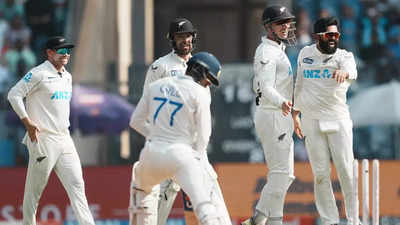India’s totals in four innings of two Tests played on turning tracks in Pune and Mumbai read 156, 245, 263 and 121. New Zealand, who emerged victorious in the first Test in Bengaluru, won the next two matches as well to become the first team to whitewash India at home in a three-Test series.
The embarrassing 46 all out in the first innings of the opening Test in Bengaluru was largely because of India’s decision to bat first in overcast and rainy conditions backfiring. But the batting failures in Pune and Mumbai were abject surrender against spin.
Ajaz Patel’s six-wicket spell, supported by Glenn Phillips’s three wickets, scripted a 25-run victory for the Kiwis on Sunday at the Wankhede Stadium while the hosts chased just 147 to win.
Trying to trap the Kiwis by rolling out a rank turner in Mumbai, India got caught themselves; and former India opener Aakash Chopra termed it as an admission that now Indian batsmen can’t play spin that well.
“Now it feels like we should admit that we can’t play spin. Let’s be very, very honest, let’s not beat around the bush,” said Chopra on his YouTube channel while analysing the third Test. “On flat tracks we can (play spin), but everybody can on a flat track. The only difference is that we play spin better than other teams on flat tracks and bowl better as well because our spinners have quality.
“So we win the quality vs quality battle. But if the track offers spin ever so slightly, then whether it is the Pune or the Wankhede in Mumbai (we fall short)…The New Zealand batters haven’t struck as a unit. Daryl Mitchell played one innings of note, similarly Tom Latham, Rachin Ravindra…Still they played spin better than us. Let’s be absolutely honest,” Chopra added.
Many of the Indian batters uncharacteristically tried playing the sweep and reverse-sweep to counter spin, which Chopra felt can’t be mastered overnight and needs a lot of practice before a batsman can execute it perfectly.
“Neither we have confidence in spin, nor we have control on our shots. We are trying to find a shot when it’s not there, trying sweeps, practicing it before the start of play every morning. But it’s like learning a new language, my friend. If you don’t know a language, it takes a lot of time to learn it,” he said.
Virat Kohli and Rohit Sharma failed to deliver in all three Tests, extending their run of poor scores in the home season, which started with the two Tests against Bangladesh before the Kiwis arrived.
Kohli scored 93 runs in three innings, while Rohit aggregated 91. Pant, who made 64 on Sunday in a losing cause, was the top-scorer of the series with 261 runs. The next best Indian batsman was Yashasvi Jaiswal, placed at number five with his 190 runs.
Pointing at the reasons behind the failure of Indian batsmen against spin, Chopra said: “Why we can’t? Because we don’t play domestic cricket. When we focus more on white-ball cricket, then that habit of playing on turning pitches vanishes. We don’t even remember when our main players last appeared in a first-class domestic match. So where are you going to practice?”
Rohit last played a domestic first-class match in 2016, while for Kohli the last domestic appearance came in 2012.
“You play international cricket, which is okay; but international cricket is played on good tracks 9 out of 10 times. When it happens on bad tracks, then you get caught. It’s happening again and again,” Chopra analysed.
India will next embark on a limited-overs tour of South Africa, before flying to Australia for five Tests of the Border Gavaskar Trophy.
Having conceded the top spot on the World Test Championship (WTC) table to Australia, India’s chances of qualifying for the WTC final are now dicey.
